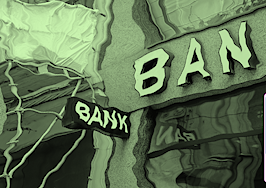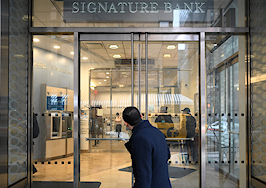In these times, double down — on your skills, on your knowledge, on you. Join us Aug. 8-10 at Inman Connect Las Vegas to lean into the shift and learn from the best. Get your ticket now for the best price.
The collapse of Silicon Valley Bank and Signature Bank over the weekend was felt beyond just tech bubbles on the East and West coasts.
The real estate community lost access to major lenders who were willing to fund home loans, housing construction projects and investors. They also held billions in real estate loans.
Industry onlookers applauded the federal government for quickly stepping in, setting up replacement banks, automatically transferring customers over to the new banks and guaranteeing deposits at the two banks.
Failing to do so could have put property managers overseeing thousands of residential units at risk of simply operating buildings, said Jay Martin, executive director of the Community Housing Improvement Program in New York.
“In the short term it’s good that the Fed came in,” Martin said. Property managers who used Signature Bank needed access the funds to “be able to make payroll, pay utilities, keep the lights on, keep the electricity going.”
What remains to be seen are the longer-term consequences the bank failures could have on real estate more broadly.
Martin, whose organization works with 4,000 owners and managers of over 400,000 rent-stabilized rental units in New York, said the dilemma shed light on an ongoing problem particularly when it comes to rent-controlled buildings in markets across the U.S.
When building owners face non-payment or steep utility fees from a sharp rise in energy costs, they often obtain loans to cover the gap between net operating income and monthly payments. When it came time to sell the building, the value typically was much higher and the loan was repaid after a sale, Martin said.
Signature was one such lender willing to cover the gap. But with its failure, Martin expects lending requirements will tighten moving forward.
“The long-term view is very concerning,” Martin said. “All these regional banks, I can’t see them looking at what happened at Signature and not deciding to be much more cautious about lending.”
There weren’t indications that the bank failures were caused by the real estate slowdown.
Multifamily loans made up 26 percent of Signature Bank’s loan mix at the end of last year, said Jay Parsons, chief economist for RealPage. Only 0.52 percent of those loans were delinquent, Parsons added, indicating those loans didn’t contribute to the bank’s failure.
Still, the closure dries up a major source of funding on the East Coast.
Signature was the largest commercial real estate lender in New York by number of transactions and third-largest by volume, having lent over $13.3 billion since January 2020, according to PincusCo, which tracks real estate transactions.
Silicon Valley Bank held $8.3 billion in residential loans and $138 million in home equity lines of credit, according to a review of the company’s annual filing with the U.S. Securities and Exchange Commission.
Those loans will be automatically transferred to the bridge banks created by the FDIC. It also held $2.6 billion in commercial real estate loans. That included $896 million in multifamily and residential and another $445 million in retail.
Silicon Valley Bank also invested in low-income housing projects that qualify for federal tax credits that can be paid to investors. It had contractual obligations to pay $754 million for affordable housing projects within the next five years from $1.3 billion in investments it made in those projects in California and Massachusetts.
Those loans have a higher risk associated with them because terms aren’t standardized, economic conditions can shift, payments can balloon or renters could simply not pay.
“Many of these are investments held by SVB Financial in third-party funds in which we do not have controlling or significant variable interests,” the firm wrote in its annual report.
In that way, one source of funding for affordable housing projects is likely to dry up. But because of the federal guarantees, there’s no immediate risk to the real estate industry, experts said.
“The current situation with SVB is a tough reminder of the challenges real estate entrepreneurs face when looking for financial backing in today’s capital markets,” said Tim Heyl, CEO of the power buyer Homeward.
Asked whether this would have spillover effects into the real estate market, Zillow founder and former CEO Spencer Rascoff told Inman, “No, I don’t think so.”
Silicon Valley Bank’s impact was likely to be felt more within the tech start-up ecosystem.
Rascoff said the vacuum created by the withdrawal of Silicon Valley Bank would be felt throughout the tech industry. The bank was a prominent debt provider for proptech companies.
“Venture debt is dead,” Rascoff said in a Twitter post. “SVB was by far the biggest provider of venture debt to startups and that product is dead for a while.”
Ryan Freedman, a general partner at the venture capital firm Alpaca, agreed.
“It won’t affect real estate or proptech disproportionally, just a matter of who has their capital at what banks,” Freedman said. “How individuals and companies hold cash will change materially after this. Trust has been broken.”
With $209 billion in total assets at the end of 2022 and about $175.4 billion in total deposits, SVB’s failure was the second-largest in U.S. history, according to Reuters, trailing only the collapse of Washington Mutual in 2008.
Signature Bank had $110 billion in assets and $88.6 billion in total deposits as of Dec. 31, according to the FDIC.
Get Inman’s Property Portfolio Newsletter delivered right to your inbox. A weekly roundup of news that real estate investors need to stay on top, delivered every Tuesday. Click here to subscribe.
















